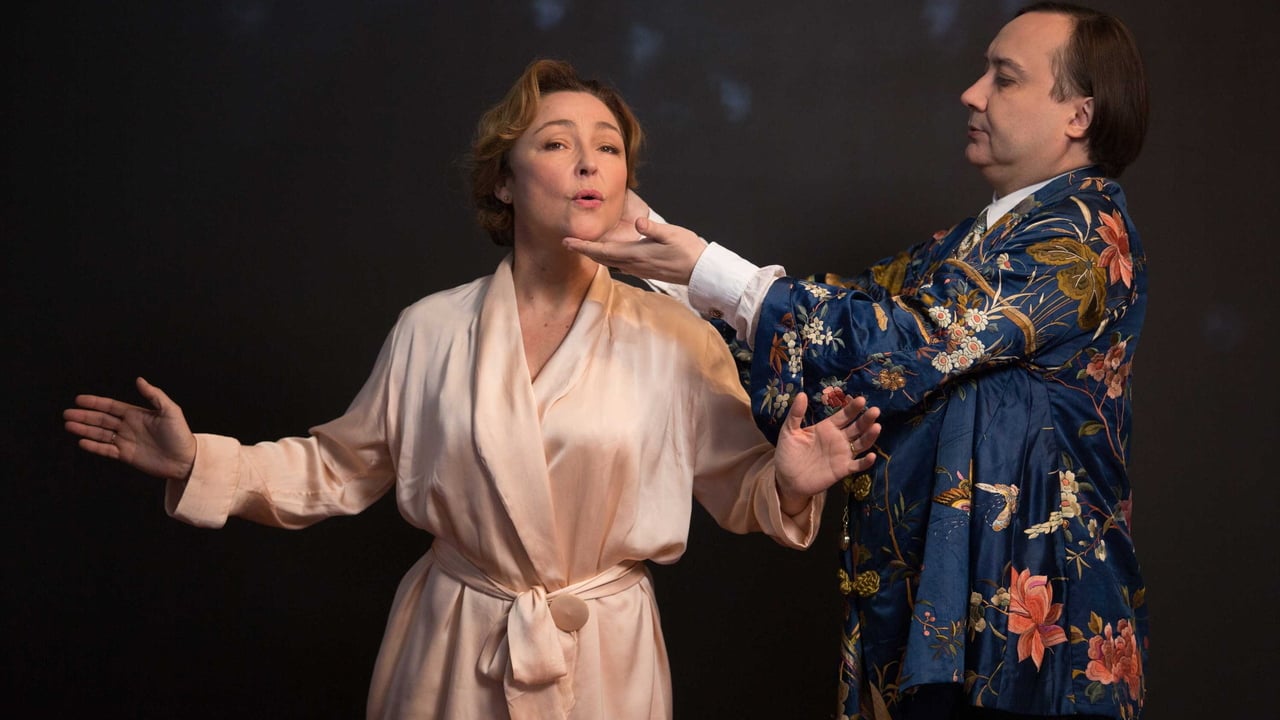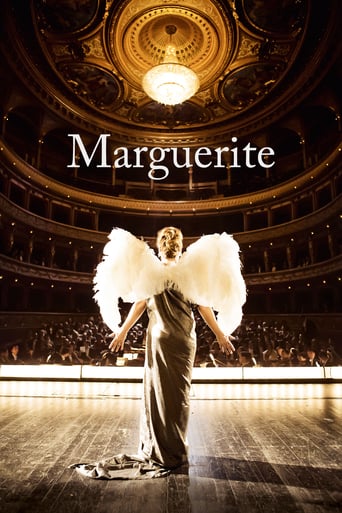lasttimeisaw
Xavier Giannoli's MARGUERITE is a Gallo-period drama borrows the inspiration from the story of Florence Foster Jenkins, and grafts it onto a rich French woman Marguerite Dumont (Frot) in the Golden twenties, whose inferior singing ability doesn't stop her from fulfilling her biggest fantasy, to organise her own concert in a real theatre.Naturally, there are two possibilities of Marguerite's apparent oblivion of her own ludicrous voice, a more plausible one is she is fully cognisant of her inadequacy but she is not deterred by it, since she has the wealth to squander, she doesn't mind (or can endure) to be the object of ridicule, as long as it pleases herself and hogs the spotlight due to her self-centred disposition; an alternative possibility could be, she actually doesn't entirely realise how awful her singing capacity is, because, maybe she has some hearing disability or very often, in reality, the recording of one's own voice sounds rather different from what one habitually conceives of, still, the scenario in the case of Marguerite is more serious, in Giannoli's script, she is building castles in the air, what enters in her own ears (while she is singing), assures that she is a qualified coloratura (or mezzo) with distinct talent, an autodidact achieves her faculties by persistent practice. I don't know if there is a medical term for her deep-rooted delusion, or more practically, it is simply Giannoli's creation, which sets to hone the climax, to see what will happen if she hears her real voice from a record player.In that case, Marguerite is really a wretch despite of her blessed (or cursed) wealth, she is a woman engulfed by lies and pretence, her husband George (Marcon), marries her for the enormous fortune, haunted by guilt, which by the way doesn't stop him from conducting an extramarital affair, and has no guts or whatsoever to rescue her from the elephant-in-the-room; others regard her as a laughing stock, either egg her on or refrain from candour for their own sake, including the opportunistic young reporter Lucien (Dieuaide) and his poet friend Kyrill (Fenoy), who merely exploits her as an anomaly for his own anarchic propaganda.It is riveting to watch Catherine Frot feigns her impassioned performance under the salvo of off- key ululation, which is carefully meted out to aptly eke out laughter in each of the film's five chapters. Besides, Ms. Frot doesn't yield to the simplified caricature of Marguerite, in lieu, her self- possessed mannerism glistens with bons mots, she balances off Marguerite's larger-than-life image with endearing subtlety which reflects her as a sensible human being, she is, after all, a woman dares to be honest with her own passion and feelings, against all odds. Comedian Michel Fau is pre-eminent in his flamboyant turn as Marguerite's singing coach Atos Pezzini, a gay opera singer, who is blackmailed into accepting this impossible task by Marguerite's loyal butler Madelbos (Mpunga), who, undoubtedly, is the most inscrutable player in Marguerite's enterprise, with his own agenda which is applied as a game-changer in the end but rings hollow in its own seriousness.Shot entirely in Czech Republic, as a fill-in for Paris, the film adopts a more subdued palette of the roaring 20s, albeit of its amazingly detailed vintage decor, as if Giannoli tries to forewarn us of the finale throughout the whole journey, MARGUERITE is not a farce of titbits, she is a by-product comes to fruition in a hypocritical society, you can mock her, but she actually accomplish something few of us dare to even start with.
david-rector-85092
'Marguerite' was for me the most anticipated inclusion of the French Film Festival touring Australia as I write this review. In part due to the pithy and alluring plot line given in the booklet for the screenings, and in part as Catherine Frot was freshly known to me since seeing 'Haute Cusine' a couple of years back. I was really impressed with the subtle but powerful presence of Ms Frot on screen. I've become most enamored with the many wonderful actresses from France and this film and performance has already put Catherine Frot into an award winning position; confirming her long and distinguished career. Rather than give away too much of the plot; i'd would prefer to sing the praises of the panoply of elements that make this movie so memorable and commendable. It is beautifully staged and executed, with a faithful commitment to the period and a skillfully cast ensemble of actors to back the leading lady. I was especially impressed with Congolese actor Denis Mpunga who lends such a solid and fascinating literal support as Marguerite's butler. Michel Fau steals every scene he is in as an overly hammy opera singer; and Andre Marcon manages to both represent and challenge the archetype of a philandering husband. While the film does run long; a shade over 2 hours; for the most part it is compelling, intriguing, amusing, sad and thought provoking. How many movies can be described that way? There were moments where I was both laughing and crying; a result of powerful direction by Xavier Giannoli who also co-wrote the film, and of course the impeccable performance from Catherine Frot. There is enormous dignity that the actress conveys as well as a hapless and at times a quiet knowing which is hugely endearing and makes Marguerite neither a victim nor a focus for ridicule. La Frot has such cinematic presence and yet at times there is great stillness to the performance; and of course there is the full bodied musical pieces that anchor the film's structure and themes. There is a majesty to the film cinematically; and despite a couple of plot strands hastily thrown in and not satisfyingly completed, there is a potency and cogency to the script and to the film's overall running time. I feel it will be one of my favorites of 2016.
writers_reign
From correspondence I've had over the years it seems that there are roughly a dozen people who tend to follow my reviews here and they will know in what high esteem I hold Catherine Frot, not least for her versatility which allows her to move effortlessly from the pathetically ditzy neglected wife in Un Air de famille to the mother from hell in Vipere au poing with virtually any and everything in between. Her first love is the stage - indeed she made her name in the stage version of Un Air of famille, which earned her a Moliere, plus a Cesar when she replicated her role, complete with dog collar, on celluloid - and for three years she has neglected the cinema for the theatre - I myself was lucky enough to see her in the Ingrid Bergman role in Cactus Flower (Fleur de cactus in French) barely a week ago, but now she is back on the screen in what I can only describe as a tour de force; Marguerite is a wealthy socialite in 1920s Paris who has an all consuming love for opera, so much so that she loves nothing better than performing arias for her society friends in salons. The problem, tragedy may not be too strong a word, is that she is totally without vocal talent yet for reasons best known to themselves her friends conspire to keep this knowledge from her and applaud every note and even pen fine reviews. Although the story is fiction - there may be a reason the character is named Marguerite Dumont; the actress Margaret Dumont, was the foil for Grouch Marx in the majority of the Marx Brothers films and was also a wealthy society lady with delusions of grandeur - it is clearly based on the life of Florence Foster Jenkins a wealthy American who also harboured the delusion that she was a world-class diva. Catherine Frot is outstanding and it may well be the finest performance she has given in the cinema, which is, of course, saying something. For some reason it appears that Meryl Streep is shooting very much the same story even as I write and this may well keep the Frot film off American - and possibly even UK - screens which would be unforgivable.
GUENOT PHILIPPE
From a true story, you have here the tale of a pearl lost in a sea of mud. The mud of hypocrisy, lie and trickery. The tale of an eccentric and wealthy woman who is married to a rich business man who cheats her with a mistress. An eccentric lady played by the outstanding Catherine Frot who has only one dream in life: singing opera, recitals, not in front of wide audiences but circles of music lovers who fake to be her friends. Those "friends" who let her think she is a great singer whilst she sings totally FALSE. Here, the audience is also guilty to laugh at this poor naive woman. Me too laughed and I am ashamed of myself. It's a genuine sad, painful story, I assure you. Catherine Frot has never been better, she gives here a terrific performance. I also appreciated the black butler character whom we at first think of him that he is Frot's close friend and dedicated house keeper. But as the film continues it appears that his behaviour is rather weird, even disgusting. During all this powerful drama I thought of Mark Robson's THE HARDER THEY FALL; the only difference is that this old movie took place in the boxing business. But for the rest, it's the same scheme. Go to see this very good feature showing how a pure pearl got drowned into an ocean of mud. The human mud.

